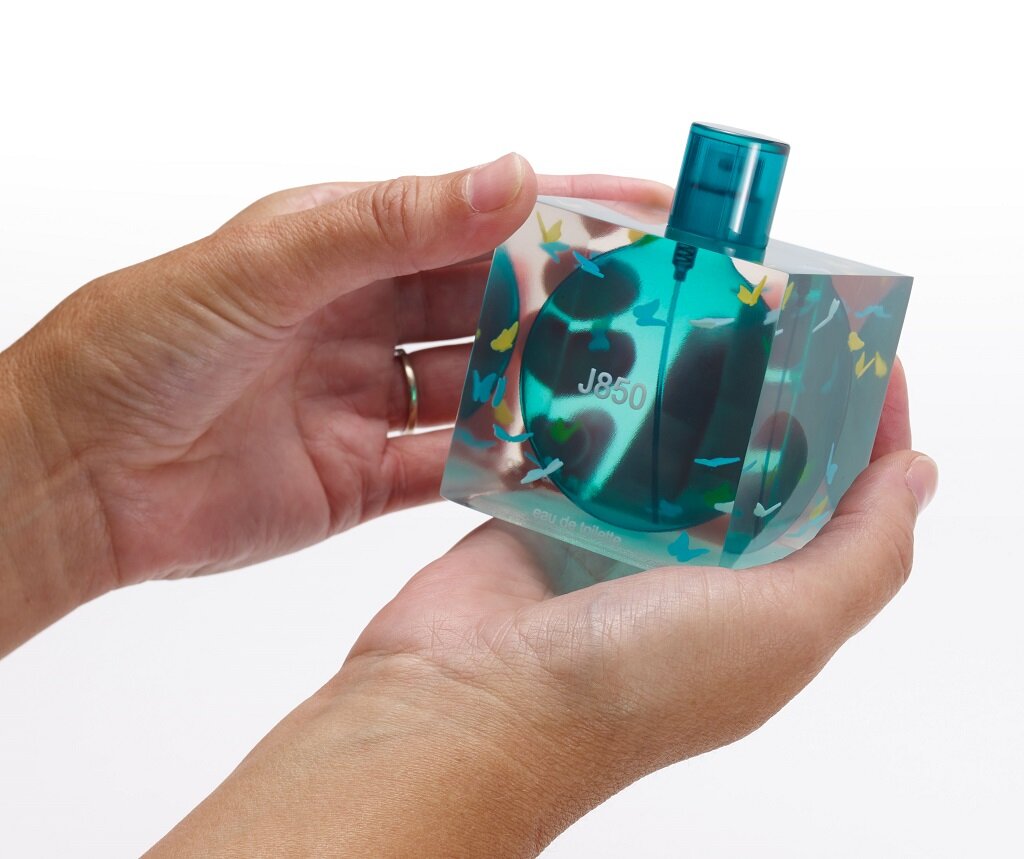![Complex multi-color prototyping is in hand wiht the J850 [Image: Stratasys]](https://fabbaloo.com/wp-content/uploads/2020/05/J850-1_img_5eb08e592ae46.jpg) Complex multi-color prototyping is in hand wiht the J850 [Image: Stratasys]
Complex multi-color prototyping is in hand wiht the J850 [Image: Stratasys]
Stratasys’ new J850 3D printer is the next generation for full-color PolyJet 3D printing.
I spoke with Tomer GaIIimidi, Rapid Prototyping Product Manager, for more detail behind the new release.
Gallimidi, who has been with Stratasys for five years, is leading all development on the PolyJet side of the portfolio. Today’s introduction of the J850 follows a few years from the announcement of the J750 — which has in that time built up a strong reputation for high-quality multi-material 3D printing.
J850
The J850 is the next generation for Stratasys’ PolyJet 3D printing, representing an end-to-end solution for the design process, GaIIimidi says.
Product design is a complicated endeavor — and one increasingly benefiting from the rapid prototyping benefits of 3D printing. This original application area remains a stronghold for the technology, even as more industrial, end-use solutions hit the market. Rapidly iterating a design significantly speeds up and streamlines the design process, ensuring a fast track to functionality with just the right look and feel.
“In general, the J850 can reduce the overall modeling time by up to 50% at a significantly lower cost,” GaIIimidi explains. “We allow users to produce concept models twice as fast as the last J-Series system. With the new Super High Speed Mode, it is twice as fast as the current high speed mode. This gives engineers and designers more time for parts refinement, more time for more iterations earlier in the process, and thus making better decisions and doubling the speed.”
Materials
![Multi-material prototyping with the J850 [Image: Stratasys]](https://fabbaloo.com/wp-content/uploads/2020/05/J850_img_5eb08e599fa97.jpg) Multi-material prototyping with the J850 [Image: Stratasys]
Multi-material prototyping with the J850 [Image: Stratasys]
The second functional upgrade for the new system is materials capacity. While the multi-material J750 platform can work with an impressive six materials, the J850 is upping it to seven.
“This is allowing our customers to print with a full-color range of the model, as well as transparent and flexibility options in a single part,” GaIIimidi continues. “When you’re talking about a full-color model, you need five colors — cyan, yellow, magenta, white, and black — and you can now add transparent and flexible materials, in one part, in one build.”
Keeping materials in mind, this announcement also includes two new introductions on that end: VeroUltraClear and Draft Grey.
UltraClear, which GaIIimidi refers to as “one of the most realistic materials from Objet,” has “high clarity with similar materials to glass” and “basically helps designers to visualize internal features and create concept models.
DraftGrey, for its part, is intended as a low-cost material targeted at rapid iteration early in the design process. Not the fanciest of materials, nor the prettiest, its neutrality is in fact its biggest virtue.
“DraftGrey is a concept material ideal for fast iterations in the beginning of the design process,” GaIIimidi says. “Basically, you combine DraftGrey with Super High Speed Mode for concept models twice as fast at half the price. It is very low cost, which can allow designers to double the number of iterations at the beginning of the design process, when you want as much iteration as possible. And why the grey color? Designers want to first evaluate the shape of the design, just its geometric shape, and don’t usually want to use color so early. Color is something that can impact decisions, and grey is something considered to be a neutral color.”
Design Workflow
Such consideration of designers’ actual workflow is no surprise, as Stratasys made sure to “always put the customer in front of us” to design this specific platform specifically for designers.
Later in the design process comes more validation, when more accurate iterations are required. And the J850 was designed for this part of the process, as well, continuing the focus on color accuracy for which the J-Series has laid a foundation.
Stratasys validated the J750 and J735 3D printers for Pantone color-matching standards earlier this year. This continues on with the J850.
“These are the first and only 3D printers in the industry working with Pantone to have that standard universal language of color noted to make much more accurate decision making and communication, allowing customers to have exactly the color they want. What they see is what they get: this is the power of Pantone,” GaIIimidi says.
The end-to-end focus for designers is “allowing great things for designers,” he continues.
Upgradeability and Availability
For customers who have already invested in the J750 and might now be worried about missing out, good news: J850 capabilities are available as an upgrade to existing installations.
“We are basically allowing our customers that already have a J750 to upgrade to the J850 with all its capabilities. The upgrade is taking place on-site, so they are not switching machines. We will do hardware and software upgrades in the field,” GaIIimidi says.
The upgrades would take about two days to complete, done fully at at the customer’s site. As with the J850 itself as a new purchase, Stratasys is not currently announcing pricing for the upgrade.
“The story here is for all designers,” GaIIimidi says in closing our conversation. “We are having here new features, new capabilities from the J750, and also focusing on the issue of design for designers, and giving them the full solution for the end-to-end design process.”
The J850 is available now.
Via Stratasys

